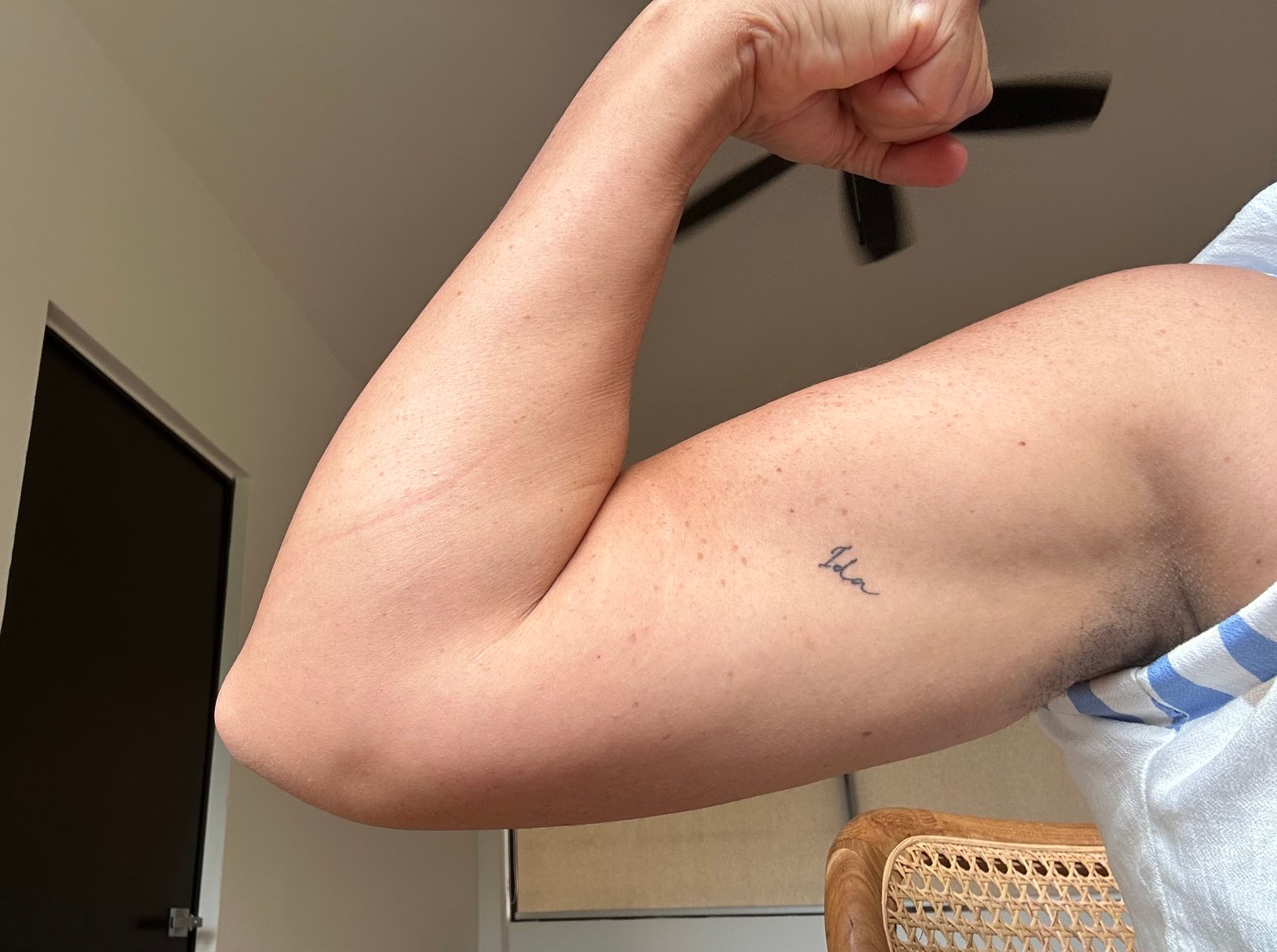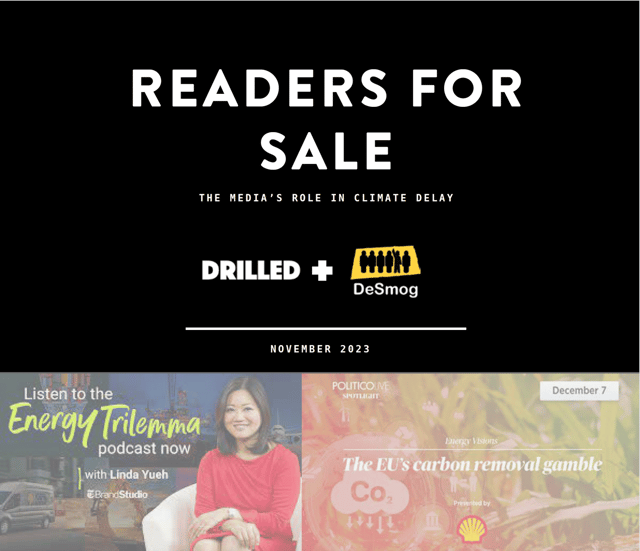
Bless you dear people for sticking with my very erratic newsletter-writing schedule. I swear to you that we will get this puppy back on a weekly track. In my defense, the small but mighty Drilled team has been working on a truly staggering number of projects at once and I've also been working on a book, and sometimes I have no steam left at the end of the week to put pen to paper. So here I am, after a long absence, with a lot to say. As is so often the case, while others have been saddened by what's happening in media lately, I have found myself positively enraged by it. I'm going to try to articulate why and maybe even formulate some ideas about what to do about it.
For a start, there's my usual gripe about people being unwilling to look at the historical roots of the current moment. Even the recent historical roots. How are so many people not seeing the role Big Tech has played in bringing the media in particular, and in a lot of ways the U.S. as a whole, to this moment in time? I'm making my way through an academic book by Michelle Amazeen, the Boston University researcher whose research on advertorials we've highlighted before and she describes the media as providing the information citizens need for self-governance. A little dry maybe, but I think it's exactly right; this is the public service the media is supposed to provide.
So let's take a quick look at how Big Tech in particular has hijacked it: the tech industry loves to talk about the emergence of digital publishing as akin to the printing press in its democratizing power, but what it has actually created is a parallel alternate media ecosystem in which a small and powerful few control the information that billions of people rely upon for self-governance. That's happened in a variety of ways, from stealing its competitor's content and thus its ability to monetize it (see phase 2: AI, electric boogaloo) to creating a system that is solely focused on engagement and attention, forcing its competitor to follow suit, to effectively avoiding any of the responsibilities that come with publishing while also seizing all of the benefits.
This essay was sent out as part of Drilled’s weekly newsletter, along with our usual list of recommendations for things to read, watch and listen to on climate and democracy. If that sounds like something you’d enjoy having delivered to your inbox, subscribe here!
The story of Bari Weiss's Substack (no I won't call it an outlet) "The Free Press" is a good illustration of the sort of fruit this new system has borne. Weiss was a contrarian opinion writer for The New York Times—not a reporter, never a reporter, though she loves to speak about herself as some sort of standard-bearer for journalism. She was hired along with climate denier Brett Stephens during one of the Times' many phases of believing the hype about itself being "too liberal" and hiring reactionary voices to counter that image. Weiss wasn't just tasked with writing controversial ragebait takes herself, but also with bringing in other voices who would do the same. After a few years, during which she made a wide range of schoolgirl errors (linking to hoax social media accounts, getting the facts wrong in myriad ways, what have you), Weiss was the one who brought in Tom Cotton's screed about how the military should be deployed to U.S. cities to shut down protests. Several of Weiss's colleagues felt it was an irresponsible editorial decision to run the piece; Weiss live-tweeted an editorial meeting about it, during which several of her colleagues claimed she was flat-out lying about the meeting, and then flounced out the door with a very public resignation letter. I've always assumed she quit before she was fired. Also, let's pause a minute here on the subject matter of that op-ed and how very real it's become, shall we? This is the Overton Window effect, baby! Throw out a radical idea, get a couple folks to normalize it, et voila you can shift public opinion in favor of something that would have been unthinkable. As we look around at the National Guard invading Chicago, Portland, and D.C., it's hard to see the Weiss-Cotton incident as just the harmless sharing of a variety of viewpoints. After leaving the NYT, Weiss started a Substack with her wife, tech reporter Nellie Bowles, who also left the Times. Once it got big enough to hire a couple of other writers and editors they called it "a media company" but it was never really more than a successful newsletter. I say that because it never moved beyond the sorts of hot takes that have made Substack millions, it remained around 90% opinion, though that didn't stop Weiss from proclaiming it a newsroom everywhere she went or people who don't know any better from repeating that lie. All of which would have been annoying but not particularly important had she not been tapped last month to lead CBS News, reporting not to any sort of editorial head but to the company's new owner, David Ellison the billionaire son of tech billionaire (and Trump funder) Larry Ellison. The Ellisons own Paramount now too, and are working on closing deals to acquire TikTok and Time/Warner, which would give them real information ecosystem dominance and the ability to control all sorts of narratives. It feels like the last domino to fall in tech's decades-long push to erase legacy media. It's important to understand why they've been so laser focused on that goal because it has to do with a lot more than money. Or at least than whatever profits these media ventures will earn them. It has a lot do with protecting their wealth generally, and the power that comes with it.
The story of how digital media ate traditional media's lunch is often told as one in which the better, smarter, faster tech simply won out and those newspaper idiots failed to figure out the business model of digital. Dummies! Are there dinosaurs in media? Absolutely. Did some of them make bad decisions as digital technologies became more prevalent? Sure. But what gets left out of this story is any intent from the tech companies. Do you really think they just accidentally kneecapped the fourth estate and gave themselves the power rich guys have been frothing at the mouth to attain since democracy first became a thing—the power to control public opinion? If so, then I'm afraid the dummy is you and I'm sorry you had to find out this way.
Erasing intent also erases accountability. Not just for the Bezoses and Musks of the world but also for those of us who work in media and still want it to do the job of giving people the information they need, not just the entertainment they want. Erasing accountability, in turn, erases political will. It creates a whole bunch of well-meaning folks who worry about things like whether or not regulating misinformation on social media is censorship and anti-free speech. One of the great successes of the tech industry over the past few decades has been its ability to convince large swathes of the public that their anti-regulatory desires, which are in fact the same as any other industry's, are actually your rights and freedoms. That they are not fighting to retain their own power and wealth, nay, but the very fabric of democracy itself. That if they are not allowed to reap all the benefits of publishers without accepting any of the responsibilities, then that means you are being stripped of your speech rights. (Yet another plug here for folks to read the book Cyberlibertarianism, which does a phenomenal job of eviscerating this myth.)
The biggest looming fight for those who care about anything from climate action to civil rights to democracy itself is not preserving the U.S. elections or securing the credibility of international climate negotiations, though yes of course those are important battles, it's protecting the rights of the two governments that have dared to take a first step towards regulating digital media—Brazil and the European Union—and batting back the idea that holding these companies to the exact same responsibilities as the companies they are trying to compete with (publishers) is somehow censorship.
And here we turn to the other thing pissing me off lately: the absolute cowardice of the media. To put a finer point on it: people who work in the media. How many times are you going to be shit on before you stand up, people?
Oooh easy to say from your privileged perch atop your own media empire, Westervelt! I need insurance! I need to pay rent! I get it, and I also feel compelled to push back on it a bit. I don't have insurance and I decided a long time ago that one way to protect myself against certain legal liabilities is to avoid having any assets at all. I also have several dependents. I'm the sole provider for a family of four, and my extended family often needs help of various kinds too. Let's just say the only thing my spouse or I will be inheriting is debt. I am also responsible for the livelihoods of several people, and I take that responsibility seriously (honestly more seriously than I take paying my own bills, has there ever been anything more stressful than being responsible for someone's rent?) I empathize with financial and professional anxiety and I've experienced it. And because I have experienced it and survived it, fear of it doesn't hold the same power over me that it once did. The same cannot be said of many people working in media, I fear. In fact I often have the same concern about folks working in media that I do of folks working in climate: not enough of 'em have ever had to make a dollar stretch and it makes them absolutely terrified of standing up to power. That is not the juice we need in this moment.
Too many people whose job is supposed to be speaking truth to power have bought into the fear that has been used to keep so many people docile throughout history, that they will be ruined and destitute and in perpetual servitude. To which I say: is that not where you are already if you're so afraid of writing or speaking the truth? Why do the job at all in that case?
I realize this might sound radical and even callous. So let me be clear: I am not advocating senseless risk-taking. I also do have privileges of various kinds, starting with the fact that I'm (mostly) white and educated and that continues to endear me to the capital class. I wouldn't say it's easy to get money, but I will say that I get invited into rooms where money sits and that is a huge opportunity. And I get that there are varying appetites for risk; I've never been particularly averse to it and so I probably wound up in the right job. But I do want to encourage my fellow journalists to reach deep and sack up and decide who you want to be in this moment, Ida Tarbell and Ida B. Wells sticking it to the man? Or Adolph Ochs, the guy who pushed the myth of objectivity and linked it to status to save the struggling New York Times back in the Progressive era?
Which brings me to the third and final target of my ire: the public. Everyone. Kidding! But also not. Because for reporters to feel empowered to do their job for society, we really need society to value that job; and to do that, people need to understand what it is that journalists do for society, when they're doing the job right.
I have ranted about this before (see below), but I talk to far too many (educated! politically engaged!) people who tell me their top source of news is an influencer. And look, I don't have a problem with the existence of "newsfluencers"--if they are better at getting people to engage with the news, then great. What I do have a problem with is that people don't seem to get that those folks can't exist without real reporters doing the actual work of information gathering and analysis.
Like every other reporter I know, I can point to numerous occasions where an aspiring (and sometimes even successful) influencer has lifted my work, repackaged it and put it out as their own. In the very best case, they might cite the outlet the story came from. But what tends to happen in this scenario is that various members of the public will say some version of "that influencer is so much better than the 'mainstream' media," and increasingly opt to give their time, money and attention to the influencer. Nine times out of ten the information that person is sharing is not from a "legacy" outlet but from an independent one like ours, OR it's coming from one of the reporters at a legacy outlet that's still doing a really good job. In either case, like the tech bros before them, the influencers are lifting the benefits of the content without any of the responsibilities. They do not take on the legal, financial, or physical security risks required to get and share that information, they do not invest the months of reporting time or work with a fact-checker to make sure it's all accurate, nor do they have the years of experience on the beat to be able to connect the dots for people. And when they cut journalists out of the equation, it's not just for that moment in time--they're contributing to cutting those jobs forever.
The answer to this probably lies in the form of more and better collaboration between the two, but it's hard for that to happen absent any acknowledgement of the value of the work that journalists are doing. So instead what's happening is that we're seeing more and more journalists laid off, while more and more newsfluencers grow their platforms, and what will happen when they no longer have reporters to pilfer stories from? Maybe they'll do their own research and reporting, sure. But will it be with the same lens--getting the public the information it needs for self governance? Being extra careful to check facts before putting them out? Seems unlikely. Or maybe they'll pull from an increasingly less credible mix of whatever sources remain in media. Both seem bad!
I get that people are mad at "the media," but it would be great if folks could loudly and publicly support the folks who are doing solid work, who are taking on the risks of speaking truth to power. It might be just the push some folks need to choose bravery.


